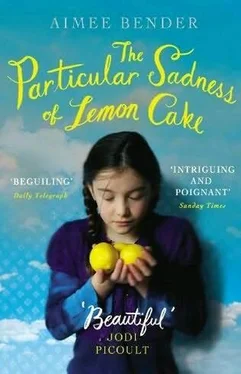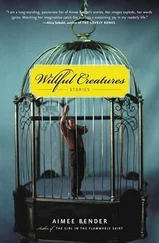Hey, he said. Check this out.
I stepped a foot inside, and watched the red light mark a dot at each ceiling convergence.
Light rays, he said.
Pretty, I said.
But what do I do about it? I asked again, after a minute.
About what?
About my food problem?
He put the red dot right on my forehead. Now you look Indian, he said.
George?
It’s not a problem, he said, moving the dot away. It’s fantastic.
I hate it, I said, tugging at the sides of my mouth.
Or maybe you’ll grow into it, he said, shooting the red dot through the keyhole in the door.
He smiled at me, and it was genuine, but it was also a smile from further away. Our boats on the river had drifted apart. There was a loyalty call he’d had to make, and I could hear the popcorn popping in the kitchen, and the alluring smell of melting butter in a pot. Joseph muttering away, as he prepared it. That popcorn, a puffy salty collapsing death. I would not eat a piece of it.
Maybe, I said.
I think, George said, you should become a superhero. He put the dot on my mouth. Open up, he said.
Laser, down my throat.
There, he said, bouncing the dot around. Supermouth.
Almost six months after the incident with the cake, on a Saturday morning in August, I awoke to the smell of fruit and leaven to discover that Mom was rummaging around in the kitchen, cooking up a summer pie from scratch. Joseph had left early to launch a battery-operated rocket with George in the park, and Dad’s car had honked at its usual exit time even though it was the weekend. Things had been tense around the house. Dad, brusque. Mom, wound up. When Dad was home, she’d tell him stories in a really fast voice and he seemed barely able to listen, eyes floating around the room.
When I shuffled into the kitchen in my pajamas that morning, she greeted me as if I was her long-lost best friend. Rose! she said when I walked up to the door. Good morning! How are you? How’d you sleep? She grabbed me in for a hug and held me tight. Her hair, freshly washed, smelled like a field of new lavender. So! she said, clapping her hands. Honey. What do you think about pie for breakfast?
The fact that she was up at all likely meant that she’d never gone back to sleep after her 2 a.m. wake-up, and that she’d started baking out of boredom at around five. Mixing bowls and spoons and sprinklings of flour covered the counter.
Or cereal? I said.
I’m trying out the newest recipe in the paper, she said. Peach-and-dingo pie. Ready, kiddo? Will you taste it with me?
Dingo? I said. Isn’t that a kangaroo?
Lingo? she said. Lingoberry? Something like that.
She pulled me to the kitchen table, beaming. It was unlike her, to be so imprecise. The morning had warnings written all over it.
My mother had been baking more often in general, but she took plates of desserts to the carpentry studio, where her boss, thank God, had a sweet tooth. He just loved the cheesecake, she’d tell me, shining. He ate all of my oatmeal cookies. Some charmed combination of the woodwork, and the studio people, and the splinter excising time with her son kept her going back to Silver Lake even when she hit her usual limits, and every night, tucked into bed, I would send out a thank-you prayer to the carpentry boss for taking in what I could not. But this morning I was the only one, and it was the weekend, and carpentry rested, and the whole kitchen smelled of hometown America, of Atlanta’s orchards and Oregon’s berry bushes, of England’s pie legacy, packed with the Puritans over the Mayflower .
You try, as a child. There was the same old dread, and there was the same old hope, and due to the hope, I ate the piece of pie she sliced on the small white plate, with a silver fork, beneath the dual lightbulbs in the ceiling fixture. In my daisy pajamas and ripped bunny socks. The taste so bad I could hardly keep it in my mouth.
What do you think? asked Mom, squinting as she tasted, leaning back in her chair, just as she had before.
We began with cake; we end with pie.
I leaned over, too. I could not, for this last time, hide any of it. I leaned right out of my chair and slumped down on the tile floor of the kitchen. I got on the floor because I had to go low. The chair was too tall. The light fixture, glaring.
Rose? she said. Baby? Are you okay?
No, I said, low.
Are you choking? she asked.
No, I said. But I closed my eyes. A gripping in my throat. The graininess of the pie dough, of the peach syrup: packed, every bite, with that same old horrible craving.
Was it her? Was it me?
It was mid-morning, and outside, I could hear the neighborhood kids on their bikes, wheels splashing through puddles from early-morning lawn waterings. It had been an unusually mild August so far, and the light outside was open and clear. In the dewy air after the spray of the sprinklers, I liked to wander down the sidewalk and scoop up any flapping worms with a folded leaf and stick them back in the dirt. I was, in general, an easygoing kid like that, a rescuer of worms. But this morning, while kids biked and swished outside, I grabbed a paper towel and dragged it hard down my tongue.
I started tearing at my mouth. Get it out! I roared.
What is it, baby? Mom asked, struggling out of her chair.
My mouth, I said, suddenly crying. The tears steaming hot, down my face. Everything flooding. I tried to pull at it-my mouth-with my fingers. Take it out! I said. Please . Mommy. Take it off my face.
The floor tile was cool, and I was so glad it was there, the floor, always there, and I put a cheek down, right on the tile, and let the coolness calm me.
Mom knelt by my side, her cheeks flushed with worry. Rose, she said. Baby. I don’t understand. What do you mean?
I threw the paper towel away. Pulled off another. Wiped down my tongue. Pulled off another. I had been avoiding my mother’s baked goods, but I had eaten her cooked dinners now for months and months, which she made for us every evening with labor and love. Trying not to show everything on my face. Eating a potato chip after every bite. I’d been spending my lunchtimes tasting bites from my friends’ lunches, navigating the cafeteria, finally finding a good piece of doughy pizza made in the school kitchen by a sad lady with a hairnet who worked far on the left. She was sad, true, but the sadness was so real and so known in it that I found the tomato sauce and the melted cheese highly edible, even good. I would try to time it just right in the cafeteria every lunchtime to get her food, because sometimes she took her lunch break right at ours; I would shove to be first in line to catch her before she left, rushing ahead, and my teacher had taken me aside to ask what was going on. There’s a lady, at the cafeteria? I said, staring at her bright-blue earring stud. You still have to stay with the class, Rose, she said, pulling me to her gaze. That same sad lady returned from her break ten minutes before the bell rang, so I took to nibbling on an apple or anything packaged until she returned and then running to her window and getting whatever she put her hands on, so that before lunch was over I could eat a feeling that was recognized. I ate fast food whenever I could, which was not unlike holding Joseph’s forearm to cross the street instead of bearing the disappointment of his hand. I was working to find, in every new setting, something filling, and my whole daily world had become consumed by it. And, day in and day out, I had been faking enjoying eating at home, through the weekly gaps and silences between my parents, through my mother’s bright and sleepless eyes, and for whatever reason, for that one time, I could not possibly pretend I liked her pie.
The pie, sitting on the counter, with two big brown slices cut out of it.
Читать дальше












